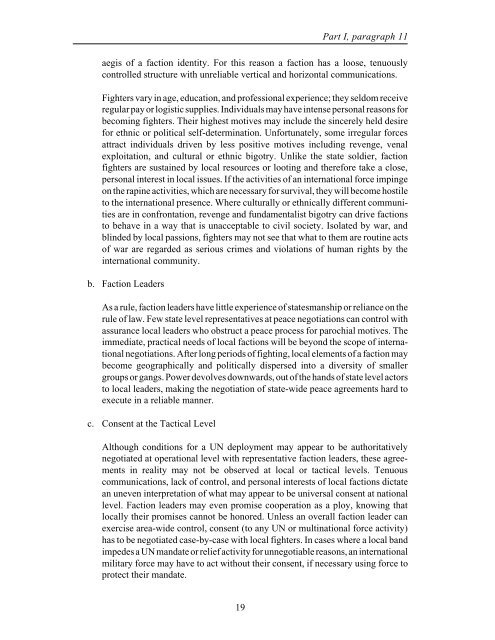a guide to peace support operations - The Watson Institute for ...
a guide to peace support operations - The Watson Institute for ...
a guide to peace support operations - The Watson Institute for ...
You also want an ePaper? Increase the reach of your titles
YUMPU automatically turns print PDFs into web optimized ePapers that Google loves.
aegis of a faction identity. For this reason a faction has a loose, tenuously<br />
controlled structure with unreliable vertical and horizontal communications.<br />
Fighters vary in age, education, and professional experience; they seldom receive<br />
regular pay or logistic supplies. Individuals may have intense personal reasons <strong>for</strong><br />
becoming fighters. <strong>The</strong>ir highest motives may include the sincerely held desire<br />
<strong>for</strong> ethnic or political self-determination. Un<strong>for</strong>tunately, some irregular <strong>for</strong>ces<br />
attract individuals driven by less positive motives including revenge, venal<br />
exploitation, and cultural or ethnic bigotry. Unlike the state soldier, faction<br />
fighters are sustained by local resources or looting and there<strong>for</strong>e take a close,<br />
personal interest in local issues. If the activities of an international <strong>for</strong>ce impinge<br />
on the rapine activities, which are necessary <strong>for</strong> survival, they will become hostile<br />
<strong>to</strong> the international presence. Where culturally or ethnically different communities<br />
are in confrontation, revenge and fundamentalist bigotry can drive factions<br />
<strong>to</strong> behave in a way that is unacceptable <strong>to</strong> civil society. Isolated by war, and<br />
blinded by local passions, fighters may not see that what <strong>to</strong> them are routine acts<br />
of war are regarded as serious crimes and violations of human rights by the<br />
international community.<br />
b. Faction Leaders<br />
As a rule, faction leaders have little experience of statesmanship or reliance on the<br />
rule of law. Few state level representatives at <strong>peace</strong> negotiations can control with<br />
assurance local leaders who obstruct a <strong>peace</strong> process <strong>for</strong> parochial motives. <strong>The</strong><br />
immediate, practical needs of local factions will be beyond the scope of international<br />
negotiations. After long periods of fighting, local elements of a faction may<br />
become geographically and politically dispersed in<strong>to</strong> a diversity of smaller<br />
groups or gangs. Power devolves downwards, out of the hands of state level ac<strong>to</strong>rs<br />
<strong>to</strong> local leaders, making the negotiation of state-wide <strong>peace</strong> agreements hard <strong>to</strong><br />
execute in a reliable manner.<br />
c. Consent at the Tactical Level<br />
Part I, paragraph 11<br />
Although conditions <strong>for</strong> a UN deployment may appear <strong>to</strong> be authoritatively<br />
negotiated at operational level with representative faction leaders, these agreements<br />
in reality may not be observed at local or tactical levels. Tenuous<br />
communications, lack of control, and personal interests of local factions dictate<br />
an uneven interpretation of what may appear <strong>to</strong> be universal consent at national<br />
level. Faction leaders may even promise cooperation as a ploy, knowing that<br />
locally their promises cannot be honored. Unless an overall faction leader can<br />
exercise area-wide control, consent (<strong>to</strong> any UN or multinational <strong>for</strong>ce activity)<br />
has <strong>to</strong> be negotiated case-by-case with local fighters. In cases where a local band<br />
impedes a UN mandate or relief activity <strong>for</strong> unnegotiable reasons, an international<br />
military <strong>for</strong>ce may have <strong>to</strong> act without their consent, if necessary using <strong>for</strong>ce <strong>to</strong><br />
protect their mandate.<br />
19

















